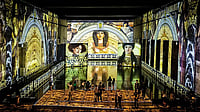
Abe inherits an economy at its buoyant best. But his performance will be judged by how he handles the delicate relations with Japan's neighbours—China and North & South Korea. The fact that Abe has no proven track record in dealing with important national and international issues will perhaps be offset by the clout and status he enjoys thanks to his illustrious pedigree—he is the grandson of Nobusuke Kishi and grand nephew of Eisaku Sato, two of postwar Japan's most powerful prime ministers. Add one more political dynasty to the Nehru-Gandhis, Bushes and Kennedys.
Though born post-World War II, Abe seems to have deep feelings about that dark period in Japan's history. He made a surreptitious visit earlier this year to the controversial Tokyo war memorial, the Yasukuni Shrine, which commemorates Japanese generals and soldiers convicted of war crimes. The memorial is seen by Japan's neighbours as a symbol of the country's World War II militarism. When Koizumi visited the shrine, there were indignant protests in the streets of Beijing and Seoul. Known to be tough-talking and hawkish, Abe is a conservative; his critics would call him extreme rightwing. They fear he will amend Japan's Constitution to allow greater leeway for the country's Self Defence Forces to act abroad. In fact, Abe is seen as the epitome of the anti-Asia, anti-China feeling that is gaining currency in Japan, making Abe-baiters nervous that he may jeopardise the present fragile balance of power in the region, with the close US-Japan alliance providing a counterweight to China's growing economic might.




















